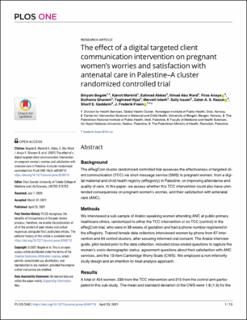| dc.contributor.author | Bungudo, Binyam Bogale | |
| dc.contributor.author | Mørkrid, Kjersti | |
| dc.contributor.author | Abbas, Eatimad | |
| dc.contributor.author | Ward, Itimad Abu | |
| dc.contributor.author | Anaya, Firas | |
| dc.contributor.author | Ghanem, Buthaina | |
| dc.contributor.author | Hijaz, Taghreed | |
| dc.contributor.author | Isbeih, Mervett | |
| dc.contributor.author | Issawi, Sally | |
| dc.contributor.author | Nazzal, Zaher A. S. | |
| dc.contributor.author | Qaddomi, Sharif E. | |
| dc.contributor.author | Frøen, J. Frederik | |
| dc.date.accessioned | 2021-06-10T14:16:43Z | |
| dc.date.available | 2021-06-10T14:16:43Z | |
| dc.date.issued | 2021 | |
| dc.identifier.issn | 1932-6203 | |
| dc.identifier.uri | https://hdl.handle.net/11250/2758886 | |
| dc.description.abstract | Background: The eRegCom cluster randomized controlled trial assesses the effectiveness of targeted client communication (TCC) via short message service (SMS) to pregnant women, from a digital maternal and child health registry (eRegistry) in Palestine, on improving attendance and quality of care. In this paper, we assess whether this TCC intervention could also have unintended consequences on pregnant women’s worries, and their satisfaction with antenatal care (ANC).
Methods: We interviewed a sub-sample of Arabic-speaking women attending ANC at public primary healthcare clinics, randomized to either the TCC intervention or no TCC (control) in the eRegCom trial, who were in 38 weeks of gestation and had a phone number registered in the eRegistry. Trained female data collectors interviewed women by phone from 67 intervention and 64 control clusters, after securing informed oral consent. The Arabic interview guide, pilot-tested prior to the data collection, included close-ended questions to capture the woman’s socio-demographic status, agreement questions about their satisfaction with ANC services, and the 13-item Cambridge Worry Scale (CWS). We employed a non-inferiority study design and an intention-to-treat analysis approach.
Results: A total of 454 women, 239 from the TCC intervention and 215 from the control arm participated in this sub-study. The mean and standard deviation of the CWS were 1.8 (1.9) for the intervention and 2.0 (1.9) for the control arm. The difference in mean between the intervention and control arms was -0.16 (95% CI: -0.31 to -0.01) after adjusting for clustering, which was below the predefined non-inferiority margin of 0.3. Women in both groups were equally satisfied with the ANC services they received.
Conclusion: The TCC intervention via SMS did not increase pregnancy-related worries among recipients. There was no difference in women’s satisfaction with the ANC services between intervention and control arms. | en_US |
| dc.language.iso | eng | en_US |
| dc.publisher | PLoS | en_US |
| dc.rights | Navngivelse 4.0 Internasjonal | * |
| dc.rights.uri | http://creativecommons.org/licenses/by/4.0/deed.no | * |
| dc.title | The effect of a digital targeted client communication intervention on pregnant women’s worries and satisfaction with antenatal care in Palestine–A cluster randomized controlled trial | en_US |
| dc.type | Journal article | en_US |
| dc.description.version | publishedVersion | en_US |
| dc.rights.holder | Copyright 2021 the authors. | en_US |
| dc.source.articlenumber | e0249713 | en_US |
| dc.identifier.doi | https://doi.org/10.1371/journal.pone.0249713 | |
| dc.identifier.cristin | 1925603 | |
| dc.source.journal | PLoS ONE | en_US |
| dc.relation.project | Norges forskningsråd: 223269 | |
| dc.relation.project | Norges forskningsråd: 234376 | |
| dc.relation.project | EU/617639 | |
| dc.identifier.citation | PLoS ONE. 2021, 16 (4), e0249713. | en_US |
| dc.source.volume | 16 | en_US |
| dc.source.issue | 4 | en_US |

